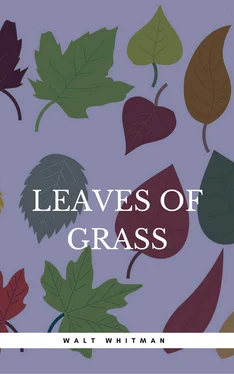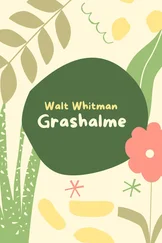Walt Whitman - Leaves of Grass
Здесь есть возможность читать онлайн «Walt Whitman - Leaves of Grass» — ознакомительный отрывок электронной книги совершенно бесплатно, а после прочтения отрывка купить полную версию. В некоторых случаях можно слушать аудио, скачать через торрент в формате fb2 и присутствует краткое содержание. ISBN: , Жанр: Языкознание, Критика, на английском языке. Описание произведения, (предисловие) а так же отзывы посетителей доступны на портале библиотеки ЛибКат.
- Название:Leaves of Grass
- Автор:
- Жанр:
- Год:неизвестен
- ISBN:9782377930524
- Рейтинг книги:4 / 5. Голосов: 1
-
Избранное:Добавить в избранное
- Отзывы:
-
Ваша оценка:
- 80
- 1
- 2
- 3
- 4
- 5
Leaves of Grass: краткое содержание, описание и аннотация
Предлагаем к чтению аннотацию, описание, краткое содержание или предисловие (зависит от того, что написал сам автор книги «Leaves of Grass»). Если вы не нашли необходимую информацию о книге — напишите в комментариях, мы постараемся отыскать её.
Leaves of Grass — читать онлайн ознакомительный отрывок
Ниже представлен текст книги, разбитый по страницам. Система сохранения места последней прочитанной страницы, позволяет с удобством читать онлайн бесплатно книгу «Leaves of Grass», без необходимости каждый раз заново искать на чём Вы остановились. Поставьте закладку, и сможете в любой момент перейти на страницу, на которой закончили чтение.
Интервал:
Закладка:
To me the sea is a continual miracle,
The fishes that swim—the rocks—the motion of the waves—the ships, with men in them—what stranger miracles are there?
25—Poem of The Child That Went Forth, and Always Goes Forth, Forever and Forever
1856:25
There was a child went forth every day,
And the first object he looked upon and received with wonder, pity, love, or dread, that object he became,
And that object became part of him for the day, or a certain part of the day, or for many years, or stretching cycles of years.
The early lilacs became part of this child,
And grass, and white and red morning-glories, and white and red clover, and the song of the phœbe-bird,
And the March-born lambs, and the sow’s pink-faint litter, and the mare’s foal, and the cow’s calf, and the noisy brood of the barn-yard or by the mire of the pond-side, and the fish suspending themselves so curiously below there, and the beautiful curious liquid, and the water-plants with their graceful flat heads—all became part of him.
The field-sprouts of April and May became part of him—winter-grain sprouts, and those of the light-yellow corn, and of the esculent roots of the garden,
And the apple-trees covered with blossoms, and the fruit afterward, and wood-berries, and the commonest weeds by the road,
And the old drunkard staggering home from the out-house of the tavern whence he had lately risen,
And the school-mistress that passed on her way to the school, and the friendly boys that passed, and the quarrelsome boys, and the tidy and fresh-cheeked girls, and the bare-foot negro boy and girl,
And all the changes of city and country, wherever he went.
His own parents—he that had propelled the father-stuff at night and fathered him, and she that conceived him in her womb and birthed him—they gave this child more of themselves than that,
They gave him afterward every day—they and of them became part of him.
The mother at home, quietly placing the dishes on the supper-table,
The mother with mild words, clean her cap and gown, a wholesome odor falling off her person and clothes as she walks by,
The father, strong, self-sufficient, manly, mean, angered, unjust,
The blow, the quick loud word, the tight bargain, the crafty lure,
The family usages, the language, the company, the furniture—the yearning and swelling heart,
Affection that will not be gainsayed—the sense of what is real—the thought if, after all, it should prove unreal,
The doubts of day-time and the doubts of night-time, the curious whether and how,
Whether that which appears so is so, or is it all flashes and specks?
Men and women crowding fast in the streets—if they are not flashes and specks what are they?
The streets themselves, and the facades of houses, the goods in the windows,
Vehicles, teams, the tiered wharves, the huge crossing at the ferries,
The village on the highland seen from afar at sunset, the river between,
Shadows, aureola and mist, light falling on roofs and gables of white or brown, three miles off,
The schooner near-by sleepily dropping down the tide, the little boat slack-towed astern,
The hurrying tumbling waves, quick-broken crests, slapping,
The strata of colored clouds, the long bar of maroon-tint away solitary by itself, the spread of purity it lies motionless in,
The horizon’s edge, the flying sea-crow, the fragrance of salt-marsh and shore-mud;
These became part of that child who went forth every day, who now goes, and will always go forth every day,
And these become of him or her that peruses them now.
26—Night Poem
1856:26
I wander all night in my vision,
Stepping with light feet, swiftly and noiselessly stepping and stopping,
Bending with open eyes over the shut eyes of sleepers,
Wandering and confused, lost to myself, ill-assorted, contradictory,
Pausing, gazing, bending, stopping.
How solemn they look there, stretched and still!
How quiet they breathe, the little children in their cradles!
The wretched features of ennuyees, the white features of corpses, the livid faces of drunkards, the sick-gray faces of onanists,
The gashed bodies on battle-fields, the insane in their strong-doored rooms, the sacred idiots,
The new-born emerging from gates, and the dying emerging from gates,
The night pervades them and enfolds them.
The married couple sleep calmly in their bed—he with his palm on the hip of the wife, and she with her palm on the hip of the husband,
The sisters sleep lovingly side by side in their bed,
The men sleep lovingly side by side in theirs,
And the mother sleeps with her little child carefully wrapped.
The blind sleep, and the deaf and dumb sleep,
The prisoner sleeps well in the prison, the runaway son sleeps,
The murderer that is to be hung next day—how does he sleep?
And the murdered person—how does he sleep?
The female that loves unrequited sleeps,
And the male that loves unrequited sleeps;
The head of the money-maker that plotted all day sleeps,
And the enraged and treacherous dispositions sleep.
I stand with drooping eyes by the worst-suffering and restless,
I pass my hands soothingly to and fro a few inches from them,
The restless sink in their beds—they fitfully sleep.
The earth recedes from me into the night,
I saw that it was beautiful, and I see that what is not the earth is beautiful.
I go from bedside to bedside, I sleep close with the other sleepers, each in turn,
I dream in my dream all the dreams of the other dreamers,
And I become the other dreamers.
I am a dance—Play up, there! the fit is whirling me fast!
I am the ever-laughing—it is new moon and twilight,
I see the hiding of douceurs, I see nimble ghosts whichever way I look,
Cache, and cache again, deep in the ground and sea, and where it is neither ground or sea.
Well do they do their jobs, those journeymen divine,
Only from me can they hide nothing, and would not if they could,
I reckon I am their boss, and they make me a pet besides,
And surround me and lead me, and run ahead when I walk,
To lift their cunning covers, to signify me with stretched arms, and resume the way;
Onward we move! a gay gang of blackguards! with mirth-shouting music and wild-flapping pennants of joy!
I am the actor, the actress, the voter, the politician,
The emigrant and the exile, the criminal that stood in the box,
He who has been famous, and he who shall be famous after today,
The stammerer, the well-formed person, the wasted or feeble person.
I am she who adorned herself and folded her hair expectantly,
My truant lover has come, and it is dark.
Double yourself and receive me, darkness!
Receive me and my lover too—he will not let me go without him.
I roll myself upon you, as upon a bed—I resign myself to the dusk.
He whom I call answers me and takes the place of my lover,
He rises with me silently from the bed.
Darkness, you are gentler than my lover! his flesh was sweaty and panting,
I feel the hot moisture yet that he left me.
My hands are spread forth, I pass them in all directions,
I would sound up the shadowy shore to which you are journeying.
Интервал:
Закладка:
Похожие книги на «Leaves of Grass»
Представляем Вашему вниманию похожие книги на «Leaves of Grass» списком для выбора. Мы отобрали схожую по названию и смыслу литературу в надежде предоставить читателям больше вариантов отыскать новые, интересные, ещё непрочитанные произведения.
Обсуждение, отзывы о книге «Leaves of Grass» и просто собственные мнения читателей. Оставьте ваши комментарии, напишите, что Вы думаете о произведении, его смысле или главных героях. Укажите что конкретно понравилось, а что нет, и почему Вы так считаете.












